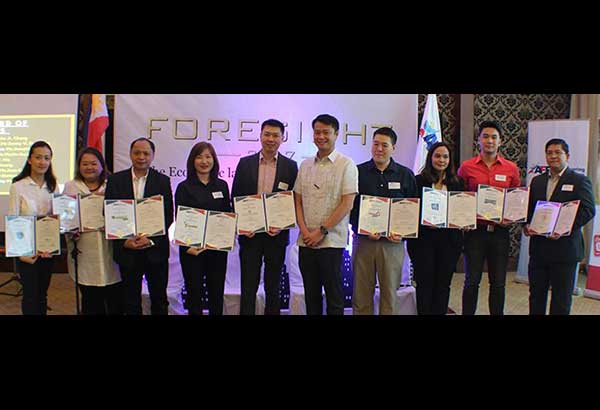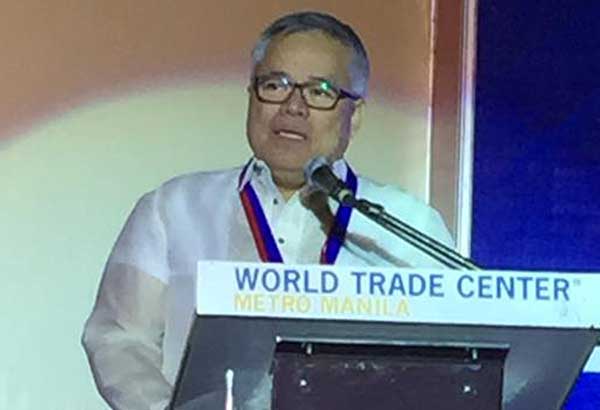The 7 ‘M’s needed to grow MSMEs

The Association of Filipino Franchisors, Inc.’s 2017 board of directors: (from left) Joyce Co Yu, Willen Ma, chairman Sonny Francisco, Josie See, president John Chung, honorary member Sen. Win Gatchalian, Byron Cheung, Jean Uvero, Paul Tan and Eric Pike Caeg
Although the big blue-chip conglomerates and firms usually grab the business headlines, the micro, small and medium-scale enterprises (MSMEs) comprise the biggest number of businesses in the Philippines and are also the largest sources of jobs in our society, so strengthening and boosting them will enhance the momentum of ASEAN’s rapid economic growth.
Encourage more micro-entrepreneurs
Let us encourage more micro-entrepreneurs, engineers, scientists, farmers and aquaculture experts in our society, instead of too many lawyers, politicians, beauty queens and models.
The Philippines’ second wealthiest billionaire, Fujian-born, Cebu-raised John L. Gokongwei Jr., recounted to me that when he was a youth, he once visited downtown Manila in the business center of then Calle Rosario (later renamed Quintin Paredes Street) in the Binondo district with his maternal grandfather, Fujian-born, Iloilo-based Pedro Marquez Lim. When he remarked that the buildings and companies were big, his grandfather told him that all those big establishments once started small.
Almost all the big business giants started as MSMEs, whether SM, JG Summit, Alliance Global Group, LT Group, Ayala, Aboitiz, etc. How do MSMEs grow and scale up, and become globally competitive in this era of rapid and irreversible globalization and fast ASEAN economic integration?
On Sept. 29, the 16th Franchise and Business Expo at World Trade Center in Pasay City was launched by the Association of Filipino Franchisors, Inc. (AFFI). The organization of homegrown Filipino business brands is led by chairman Sonny Francisco of Ferino’s Bibingka and president John Chung of Swiss Fragrances, Inc.
1,500 franchisees equals over a million jobs
Special guests who expressed support for Philippine MSMEs and optimism about the country’s inclusive economic growth through AFFI were led by Vice President Leni Robredo, Senator Cynthia Villar, Senator Sherwin Gatchalian, Department of Trade & Industry Secretary Ramon “Mon” M. Lopez and DTI Undersecretary Nora K. Terrado.
Lopez shared that the Philippine franchising industry registered P16 billion in sales in 2015 and that this sector grew by 20 percent in 2016. He said that the franchising industry is projected to grow 30 percent by 2018 and the Philippines is expected to cement its footing as “the franchise hub of Asia.”
According to Lopez, there are currently 1,500 franchisees in the Philippines with 65 percent of these being homegrown Philippine brands like Jollibee, Chowking, Goldilocks, Bench, Penshoppe, Mang Inasal, Max and others. These businesses have about 140,000 franchise outlets and are generating more than a million jobs.
To grow MSMEs, Lopez outlined what he called the “7Ms framework,” which the Duterte government — through the DTI and private sector groups like AFFI — will advocate and promote.
Mindset — Secretary Mon Lopez said MSMEs’ businesspeople should be “infused with the entrepreneurial mindset and attitude.” They’re doing this through DTI’s Negosyo Center Seminars and GoNegosyo’s “Mentor Me” program of asking top entrepreneurs to speak to aspiring entrepreneurs and MSME owners nationwide.
I believe that entrepreneurship can’t really be taught in the classrooms of business schools, universities, or crash-course seminars, but it is best learned by actual practice, similar to swimming or riding a bicycle. One can learn theories, principles, guidelines and ideas from lectures or seminars, but the real learning starts by actually going into entrepreneurship.
What many self-made ethnic Chinese entrepreneurs have been doing for generations all over Asia is to work for an entrepreneur or an entrepreneurial family, then, like an apprentice baker or apprentice chef, learn the ropes from the master entrepreneur or boss who usually lets trusted employees do all sorts of work within the firm.
Mastery — Aspiring entrepreneurs and MSME owners need to be taught to master “the know-how and how-tos of entrepreneurship, from the setting up of a business to the basic rules of spotting market opportunities and finding product positioning and differentiation.”

DTI Secretary Mon Lopez at the opening of the Franchise Expo by AFFI
In my opinion, the DTI and business organizations like the Federation of Filipino Chinese Chambers of Commerce & Industry (FFCCCII) and AFFI can try to tap our very rich pool of business, management and legal teachers in colleges, universities, and business schools to dialogue with MSMEs and aspiring micro-entrepreneurs on such topics as bureaucratic red tape, legal issues, labor to banking procedures, and even information technology.
Mentoring — Private sector groups like AFFI, Go Negosyo, and FFCCCII will be sent by DTI to give business guidance through its “Kapatid Mentor ME” program. This program is quite unique and interesting, providing not only knowhow and experience but also inspiring examples for MSMEs.
Money — President Duterte seeks to curb and lessen dependence on the so-called “5-6” lenders by MSMEs and aspiring micro-entrepreneurs through the “Pondo Pagbabago at Pagasenso” or P3 micro-finance program, and also by connecting them to other lower-interest lenders and microfinance institutions.
Although some sectors tend to demonize the Indian Sikh moneylenders, accusing them of being “usurers” or allegedly charging “too-high interest rates,” not a few of them actually provide a very crucial and essential service to the poorest of the poor and the smallest micro-entrepreneurs in slum communities or dangerous neighborhoods that most of us wouldn’t want to go to.
I think the government’s microfinance program is noble and good; it will help MSMEs and micro-entrepreneurs, but the traditional moneylenders have their own niche markets in high-risk and micro-loans. I hope the government not only provides loans but also more financial literacy education for the masses.
Machine — Knowledge of the right tools and equipment will be provided to MSMEs to ensure quality production under DTI’s Shared Services Facility (SSF) program.
In this machine category, I urge DTI and the Duterte government to invest more in technologies for the smallest businesses to expand production, and also help them galvanize information technology as a great equalizer.
To the next DICT head in the Duterte government, please speed up and lower the costs of Internet and telecommunications services nationwide to support MSMEs.
Market — DTI seeks to promote MSME products through provincial and national trade fairs, One-Town, One Product (OTOP) shows, the DTI’s “Go Lokal!” retail store concepts in major shopping malls like SM and Robinsons, also in internationally recognized FAME exhibits. DTI will also link MSMEs to big firms’ local or regional value chains, even to the government itself as a customer.
I encourage DTI Secretary Mon Lopez and President Duterte to tap the huge new opportunities opened up by this government’s bold, nationalist and pragmatic independent foreign policy to make MSMEs do more trade and export to the world’s biggest and fastest-growing major consumer market of China, the energy superpower and world’s largest land-mass country of Russia, Middle Eastern nations like oil-rich Iran, Latin America, Central Asia, etc.
Please use economic diplomacy and President Duterte’s highest-level rapport with world leaders and Asian leaders to open up more export, tourism and labor markets to benefit the Philippines economically.
Models — DTI, with the help of private sector groups, seeks to give MSMEs different business ideas, from traditional enterprises to direct-selling concepts and to franchising models, to guide micro-enterprises towards success, sustainability and growth.
It is sad that in the past, the Philippines focused too much on political democracy and neglected the importance of achieving true economic democracy.
How can a country’s political democracy be genuine and stable if a majority of the people are born homeless and have no real stake in the economy? We need first and foremost to lift the poor masses of people to become a broad-based, affluent middle-class as the solid foundation of true democracy, and one of the best ways to achieve this is to promote capitalism or the grassroots free enterprise of MSMEs and micro-enterprises.
* * *
Thanks for your feedback! Email willsoonflourish@gmail.com or wilsonleeflores@yahoo.com. Follow @wilsonleeflores on Instagram, Twitter, Facebook, read my blog wilsonleeflores.com. Listen also to my radio show on Radio Veritas Mondays to Fridays at 5:30 p.m., AM 846 kHz, online livestream www.veritas846.ph & Cignal TV channel 313, “Pandesal Forum sa Veritas.”


















